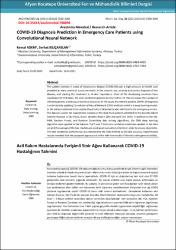Covid-19 diagnosis prediction in emergency care patients using convolutional neural network
Künye
Adem, K , Kılıçarslan, S . (2021). COVID-19 Diagnosis Prediction in Emergency Care Patients using Convolutional Neural Network . Afyon Kocatepe Üniversitesi Fen Ve Mühendislik Bilimleri Dergisi , 21 (2) , 300-309 . DOI: 10.35414/akufemubid.788898Özet
The sudden increase in cases of Coronavirus disease (COVID-19) puts a high pressure on health care providers in many countries across the world. In the present case, an early and correct diagnosis of the disease, and starting the treatment is of vital importance. Most of the developing countries have insufficient RT-PCR tests, the most verified diagnostic test for COVID-19. This increases the number of infected patients and delays preventive measures. In this study, the risk of a positive COVID-19 diagnosis is estimated by applying Convolutional Neural Network (CNN) method, which is a deep learning model, to the dataset obtained from routine blood tests of all patients who admitted to the emergency service. The dataset used in the experiments consists of the data from patients admitted to the Israelita Albert Einstein Hospital in São Paulo, Brazil, between March 28th and April 3rd, 2020. In addition to the J48, ANN, Random Forest, and Random Committee data mining algorithms, the CNN deep learning algorithm were applied to the dataset. The 5 and 7 fold cross validation model was applied to the data set and the average of the two models was used as an evaluation criterion in order to ensure objectivity. The best prediction performance was obtained by the CNN method by 92.52% accuracy. Experimental results revealed that the proposed approach is in line with the results of the tests with general validity. Koronavirüs hastalığı (COVID-19) vakalarındaki ani artış dünya genelinde birçok ülkenin sağlık hizmetleri üzerinde yüksek bir baskı oluşturmaktadır. Mevcut durumda hastalığın erken ve doğru tanısının koyulup tedaviye başlanması hayati önem taşımaktadır. COVID-19 için en doğrulanmış tanı testi olan RT-PCR gelişmekte olan ülkelerin çoğunda yetersizdir. Bu durum enfekte olan hasta sayısını arttırmakta ve önleyici tedbirleri geciktirmektedir. Bu çalışma ile acil servise gelen tüm hastalardan rutin olarak alınan kan testlerinden elde edilen veri kümesine derin öğrenme modellerinden Evrişimsel sinir ağı (CNN) yöntemi uygulanarak pozitif COVID-19 tanısı riski tahmin edilmektedir. Deneylerde kullanılan veri kümesi Brezilya, São Paulo’de bulunan Israelita Albert Einstein hastanesine başvuran hastalardan 28 Mart – 3 Nisan tarihleri arasındaki alınan verilerden oluşmaktadır. Veri kümesine J48, YSA, Random Forest ve Random Comittee veri madenciliği algoritmalarının yanında CNN derin öğrenme algoritması uygulanmıştır. Veri kümesine 5 ve 7 katlı çapraz geçerlilik modeli uygulanarak objektifliğin sağlanması açısından iki modelin ortalaması değerlendirme ölçütü olarak kullanılmıştır. En iyi tahmin performansı olan %92.52 doğruluk değeri CNN yöntemi ile elde edilmiştir. Deneysel sonuçlar, önerilen yaklaşımın genel geçerliliği bulunan testlerin sonuçları ile paralellik gösterdiğini ortaya koymaktadır.
Kaynak
Afyon Kocatepe Üniversitesi Fen ve Mühendislik Bilimleri DergisiCilt
21Sayı
2Bağlantı
https://dergipark.org.tr/tr/pub/akufemubid/issue/62252/788898https://doi.org/10.35414/akufemubid.788898
https://hdl.handle.net/11630/8999
Koleksiyonlar
- Cilt 21 : Sayı 2 [25]



















